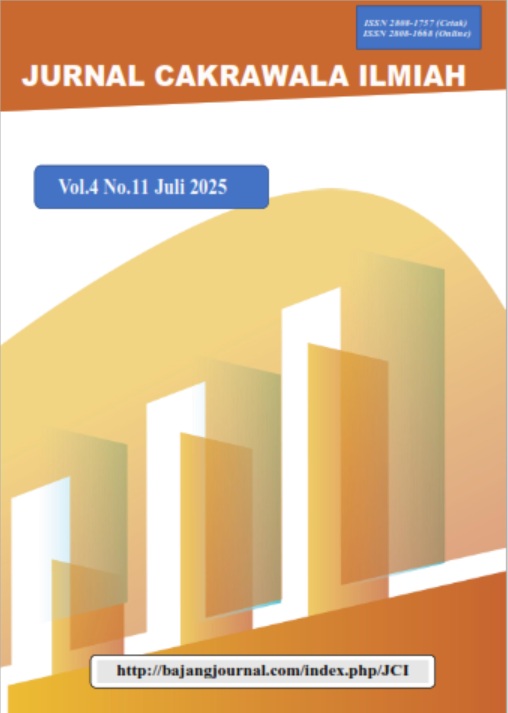STABILISASI TANAH LEMPUNG DENGAN MENAMBAHKAN SERBUK KAYU TERHADAP TINGKAT KEPADATAN TANAH DI DUSUN LANANG
Keywords:
Soil Stabilization, Sawdust, CBRAbstract
In civil construction, soil plays a crucial role. It must be capable of bearing the entire structural load to prevent failure or damage to the construction. Visually, Dusun Lanang in Lampasio Village is one of the areas characterized by clay-type soil. The main issue with this soil is that it becomes extremely hard during the dry season and excessively soft during the rainy season, making roads and ground surfaces easily damaged. Therefore, stabilization of the soil is necessary. Soil stabilization, in principle, aims to improve the quality of substandard soils. According to Bowles (1984), if the soil in the field is very loose or highly compressible, or if it has an inappropriate consistency index, excessively high permeability, or other undesirable properties that render it unsuitable for a construction project, then stabilization is required. In this study, the author used Sawdust as a stabilizing agent for clay soil, with additive variations of 5%, 10%, and 15%. Based on data analysis obtained from tests conducted at the Laboratory of the Public Works Department of Tolitoli Regency, it can be concluded that the clay soil in Dusun Lanang, Lampasio Village, Lampasio District, is of medium to high plasticity and is considered poor as a subgrade material. The addition of Sawdust to the clay soil significantly improved the California Bearing Ratio (CBR) value. The original soil density was recorded at 0.39%. With the addition of 5% Sawdust, the density increased to 2.09%. A 10% addition resulted in a density of 2.19%, while a 15% addition achieved a density of 4.70%.
References
Abdul Muktadir (2014),Stabilisasi Tanah Lempung Dengan Bahan Serbuk Kayu Terhadap Kuat Tekan Bebas. Universitas Muhammadiyah Sorong.
Bowles (1984), Sifat-Sifat Fisis dan Geoteknis Tanah (Mekanika Tanah), Terbitan Erlangga 1984.
Das (1995), Mekanika Tanah 1. Jakarta:Erlangga.
Das (1985), Mekanika Tanah (Prinsip-Prinsip Rekayasa Geoteknis), Jilid 1.
Terjemahan oleh Mochtar, 1995 Jakarta:Erlangga.
Hardiyatmo (1999), Mekanika Tanah 1, PT Gramedia Pustaka Umum.
Herman FR Oviza(2017),Pengaruh Waktu Pemeraman Terhadap Nilai Kembang Susut Tanah Lempung Yang Distabilisasikan Dengan Abu Serbuk Kayu. ITP Sumatra Barat.
Imam Trianggoro, Oktavianus Klau Bria, Magdafenta Simanjuntak (2020),Stabilisasi Tanah Lempung Dengan Menggunakan Matrial Abu Batu QUARRY II. Politenik Saint Paul Sorong.
Kedzi (1979), Stabilized Earth Roads Scientific Publishing Company, Amsterdam London - New york.
M Faizal Alridho, Soewignjo Agus Nugroho, Ferry Fatnanta (2019),Efek Penambahan Abu Serbuk Kayu Pada Lempung Plastisitas Tinggi Yang Distabilisasi Dengan Kapur Semen. Universitas Riau, PekanBaru.
Nodali ndaraha (2010), Uji komposisi bahan pembuat briket bioarang tempurung kelapa dan serbuk kayu terhadap mutu yang dihasilkan, Medan, Universitas Sumatra Utara.
Oviza (2016), Pengaruh waktu pemeraman terhadap nilai kembang susut tanah lempung yang distabilisasi denganabu serbuk kayu, 3(1).
Rinaldy (2018), pengaruh penambahan serbuk bata ringan terhadap potensial swelling pada tanah lempung ekspansif, di Daerah Wiyung Surabaya.
Sari (2018), Pengaruh penambahan abu limbah kertas terhadap kembang susut tanah lempung, Jurnak Teknik Sipil ITP.
Supriyono (1997), Stabilisasi tanah lempung ekspansif dengan kapur, Media Teknik No 1, UGM Yogyakarta.
Yudha P(2018),Pengaruh Penambahan Bottom Ash Pada Tanah Lempung Ekspansif Di Daerah Lakarsantri Surabaya Terhadap Nilai Daya Dukung Pondasi Dangkal. Jurnal Teknik Sipil UNESA.
Downloads
Published
How to Cite
Issue
Section
License
Copyright (c) 2025 Jurnal Cakrawala Ilmiah

This work is licensed under a Creative Commons Attribution-NonCommercial 4.0 International License.
















